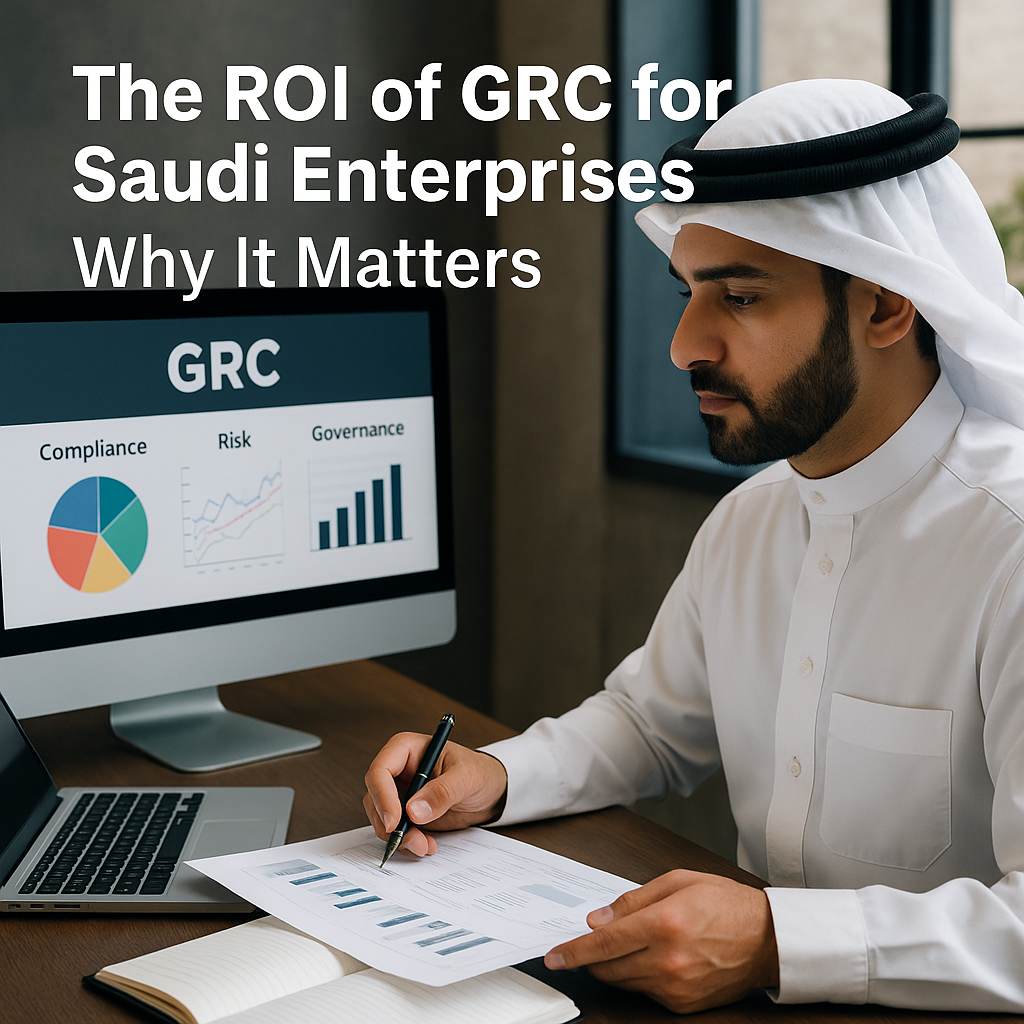
• Introduction: Why GRC Is the Best Investment Saudi Businesses Can Make
In an era of heightened regulatory scrutiny and economic diversification, Saudi businesses are under pressure to not only comply—but excel. A recent PwC study found that companies with mature governance, risk, and compliance (GRC) frameworks outperform competitors by 25% in shareholder returns.
But how exactly does GRC translate into measurable ROI for Saudi enterprises? And why is it becoming indispensable across sectors like finance, oil & gas, and real estate in the Kingdom?
With Vision 2030 pushing for higher corporate transparency and a stronger regulatory framework, the GRC landscape in Saudi Arabia is evolving fast. In this blog, we’ll break down the real value behind GRC investments—and why now is the time to act.
• What Is GRC? A Simple Explanation for Saudi Leaders
Governance, Risk, and Compliance (GRC) is an integrated approach that enables organizations to align business objectives with risk management and compliance requirements.
- Governance ensures that organizational decisions align with overall business strategy and ethics.
- Risk Management helps identify, assess, and mitigate internal and external threats.
- Compliance ensures adherence to laws, regulations, and internal policies.
Think of GRC as the nervous system of your business—detecting issues early, guiding decisions, and helping your organization operate efficiently and ethically.
• Why GRC Matters More Than Ever in Saudi Arabia
Saudi Arabia’s regulatory and economic landscape is transforming rapidly:
- Vision 2030 initiatives demand stronger transparency and ESG reporting.
- Zakat, Tax and Customs Authority (ZATCA) now enforces stricter VAT and e-invoicing rules.
- Saudi Central Bank (SAMA) is raising expectations for cyber risk governance and financial controls.
- Corporate governance regulations under the Capital Market Authority (CMA) require boards to implement risk-based strategies.
These factors make GRC not just a compliance requirement—but a competitive advantage for Saudi firms. Those failing to adopt GRC frameworks risk fines, reputational damage, and loss of investor trust.
• Challenges Saudi Enterprises Face Without GRC
Implementing GRC isn’t just plug-and-play—Saudi businesses often grapple with the following challenges:
Lack of Centralized Risk Management
Data silos and manual spreadsheets make it hard to track and assess risks across departments.
Compliance Complexity
Frequent regulatory updates from ZATCA, SAMA, and CMA require constant monitoring—missing one change can lead to non-compliance.
Board Oversight Gaps
Many boards still lack real-time visibility into compliance and risk data, which hinders strategic decision-making.
Resource Constraints
SMEs in Saudi Arabia often lack the in-house expertise to build robust GRC systems.
• How to Achieve ROI with GRC: Expert-Backed Solutions
To realize ROI from GRC, Saudi businesses should adopt a structured, tech-enabled approach. Here are best practices:
- Integrate GRC into Corporate Strategy
- Align GRC objectives with business goals (e.g., market expansion, ESG alignment).
- Involve C-suite and board leadership in GRC planning and oversight.
- Use GRC Software for Real-Time Monitoring
Platforms like CG BOD offer:
- Automated risk assessments
- Compliance tracking dashboards
- Regulatory update alerts
- Centralized policy management
- Establish Cross-Functional Governance Committees
Create internal teams representing IT, Legal, Audit, and HR to oversee governance performance.
- Adopt a Risk-Based Compliance Model
Rather than react to regulations, proactively assess where your biggest risks lie and prioritize compliance there.
- Train Employees on Compliance Culture
Use microlearning modules and regular policy updates to ensure workforce alignment with governance goals.
• Real-World Success: GRC in Action in Saudi Arabia
Case Study: A Riyadh-Based Holding Company
Challenge: Non-compliance with updated CMA board regulations
Solution: Implemented CG BOD’s automated board governance module
Outcome:
- 40% reduction in compliance-related penalties
- Board approval time cut from 3 days to 6 hours
Case Study: Fintech SME in Jeddah
Challenge: Difficulty managing SAMA compliance across multiple products
Solution: Introduced CG BOD’s centralized GRC platform
Outcome:
- Achieved SAMA audit pass in first attempt
- Identified and mitigated 15+ high-risk vulnerabilities
• Conclusion: GRC Isn’t a Cost—It’s a Growth Multiplier
Saudi businesses that treat GRC as a strategic investment rather than an expense gain more than compliance—they build resilient, investor-ready, and future-proof operations.
To start realizing real ROI:
- Integrate GRC into board and executive strategies
- Choose scalable, Saudi-regulation-compliant platforms like CG BOD
- Create a culture of governance and ethical accountability
